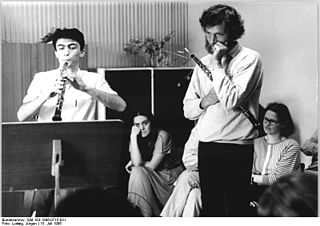Related Research Articles
Alfred Thomas Müller is a German conductor, composer and pianist. He won the 1988 Handel Prize presented by the city of Halle.
Hans Albert Oskar Stieber was a German conductor, composer and violinist. He was the founding director of the Hochschule für Theater und Musik in Halle an der Saale.
Klaus Hortschansky was a German musicologist.
Hans Joachim Marx is a German music historian. He has been professor of European music history at the University of Hamburg.
Rogier Michael von Bergen was a Franco-Flemish composer, singer and Kapellmeister of the late Renaissance.

Burkhard Glaetzner is a German oboe virtuoso und conductor. He is one of the leading oboe players in Germany.
Christoph Sramek is a German music historian and music critic.
Karl Ottomar Treibmann was a German composer and music educator. From 1981 until his retirement in 2001, he was professor of music theory and Tonsatz at the Leipzig University. He was one of the representatives of modernity in the German Democratic Republic, whose great major works can be found in the areas of opera, symphony and chamber music.
Thomas Reuter is a German composer, choral conductor, and a pianist focused on free improvisation.
Walter Thomas Heyn is a German guitarist, composer and music producer.
Christian Münch is a German composer, organist, pianist and conductor.
Thomas Christoph Heyde is a German composer, media artist and curator. He is chairman of the Forum Zeitgenössischer Musik Leipzig.
The Ludwig Schuster Quartet was a string quartet from Halle (Saale) active in the 1950s and 1960s. It was named after first violin Ludwig Schuster.
Stephan Stompor was a German musicologist and dramaturg.
Annegret Rosenmüller is a German musicologist.
Fritz Reuter was a German musicologist, music educator, composer and Kapellmeister. Reuter was one of the most important German music educators of the 20th century. After studying music and musicology in Dresden and Leipzig, with Teichmüller, Riemann, Schering and Abert, he received his doctorate in 1922. In 1945, he was appointed Kapellmeister at the Volksoper in Dresden. In 1949, he was appointed as the first professor of music education at a German university. He was also director of institutes at the Martin Luther University of Halle-Wittenberg and the Humboldt University Berlin. In 1955, he was one of the initiators of the first Hallische Musiktage.
Walter Draeger was a German composer and music educator. Er war Professor an der Staatliche Hochschule für Theater und Musik Halle and the Hochschule für Musik Franz Liszt, Weimar. In 1955, war er Mitinitiator der ersten Hallische Musiktage.
Horst Förster was a German conductor, choirmaster, violinist and university teacher. In 1952, he was appointed the youngest General Music Director of the GDR in the Landestheater Eisenach. Afterwards, he was chief conductor of the Philharmonisches Staatsorchester Halle and the Singakademie Halle (1956–1964) as well as the Dresden Philharmonic (1964–1966), and of Belgrade Philharmonic Orchestra from 1985-1986.

The Philharmonische Staatsorchester Halle was a symphony orchestra in Halle that existed from 1946 to 2006, which functioned as a concert orchestra and was last predominantly supported by the Land of Saxony-Anhalt. As a result of the fusion with the Orchester des Opernhauses Halle, the Orchestra was merged into the Staatskapelle Halle in 2006.

The Hans Stieber Prize is a promotional prize for composers of serious and light music, which is awarded by the fiduciary trust Hans Stieber Foundation of the Landesverband Sachsen-Anhalt Deutscher Komponistenverband based in Halle (Saale). The name giver and dedicatee is Hans Stieber (1886–1969), composer and founding director of the Staatliche Hochschule für Theater und Musik Halle.
References
- ↑ Christoph Rink: Handel Prize - Handel Research Prize. In Announcements of the Friends and Supporters' Association of the Handel House Halle e.V.. 1/2014, pp. 11–13, here p. 12.
- ↑ Rezeption von Musik der Schützzeit in Kompositionen des 20. Jahrhunderts on WorldCat
- ↑ Kürschners Musiker-Handbuch 2006 : Solisten, Dirigenten, Komponisten, Hochschullehrer on WorldCat
- ↑ Thomas Buchholz. Skizzenblätter zu Leben und Werk des halleschen Komponisten on WorldCat